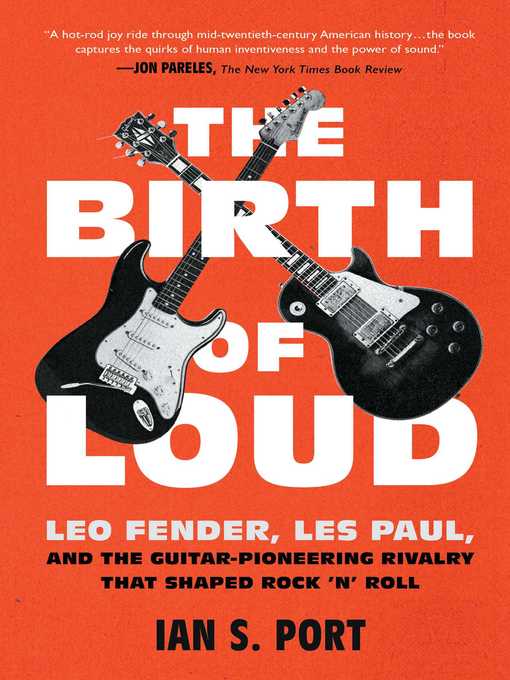The Birth of Loud
Leo Fender, Les Paul, and the Guitar-Pioneering Rivalry That Shaped Rock 'n' Roll
In the years after World War II, music was evolving from big-band jazz into rock 'n' roll—and these louder styles demanded revolutionary instruments. When Leo Fender's tiny firm marketed the first solid-body electric guitar, the Esquire, musicians immediately saw its appeal. Not to be out-maneuvered, Gibson, the largest guitar manufacturer, raced to build a competitive product. The company designed an "axe" that would make Fender's Esquire look cheap and convinced Les Paul—whose endorsement Leo Fender had sought—to put his name on it. Thus was born the guitar world's most heated rivalry: Gibson versus Fender, Les versus Leo.
While Fender was a quiet, half-blind, self-taught radio repairman, Paul was a brilliant but headstrong pop star and guitarist who spent years toying with new musical technologies. Their contest turned into an arms race as the most inventive musicians of the 1950s and 1960s—including bluesman Muddy Waters, rocker Buddy Holly, the Beatles, Bob Dylan, and Eric Clapton—adopted one maker's guitar or another. By 1969 it was clear that these new electric instruments had launched music into a radical new age, empowering artists with a vibrancy and volume never before attainable.
In "an excellent dual portrait" (The Wall Street Journal), Ian S. Port tells the full story in The Birth of Loud, offering "spot-on human characterizations, and erotic paeans to the bodies of guitars" (The Atlantic). "The story of these instruments is the story of America in the postwar era: loud, cocky, brash, aggressively new" (The Washington Post).
-
Creators
-
Publisher
-
Release date
January 15, 2019 -
Formats
-
Kindle Book
-
OverDrive Read
- ISBN: 9781501141768
-
EPUB ebook
- ISBN: 9781501141768
- File size: 46230 KB
-
-
Languages
- English
-
Reviews
-
Library Journal
November 1, 2018
Port draws on his skills as a music journalist (Rolling Stone; the Village Voice) with this page-turning look at two central players in the sonic evolution of popular music. Leo Fender (1909{amp}ndash;91), who never played an instrument, and Les Paul (19152{amp}ndash;009), who revolutionized guitar playing and recording, created the most iconic weapons in the rock arsenal: the Fender Stratocaster, and the Gibson Les Paul. Millions of words have been written about the legends who play electric guitar{amp}mdash;and men such as Dick Dale and Eric Clapton certainly make appearances here{amp}mdash;but it's the inventors who finally take the stage this time around, and Port explores their trials and tribulations with an expert hand. This is a long-overdue cultural biography of musical innovation. VERDICT Thoroughly entertaining and deeply informative, this love letter to American creativity and rock and roll belongs in every library and should be read by all rock fans. [See Prepub Alert, 7/2/18.]{amp}mdash;Peter Thornell, Hingham P.L., MA
Copyright 2018 Library Journal, LLC Used with permission.
-
Kirkus
November 1, 2018
A rip-roaring journey through the early days of rock 'n' roll, told through the lives of the men whose innovative guitars helped usher it into existence.In his first book, former San Francisco Weekly music editor Port offers an apt approach to the story of rock, in which the protagonists are less Leo Fender (1909-1991) and Les Paul (1915-2009)--whose instruments helped create the sounds associated with the genre--than the instruments themselves. In the hands of artists like Buddy Holly, Eric Clapton, and Jimi Hendrix, the Fenders and the Gibson Les Paul revolutionized the way guitar was perceived, how it was played, and, crucially, how it was heard. At the center of the narrative are the two opposite personalities behind the instruments, and their biographies are fascinating in their own rights--though workhorse Paul winds up much less compelling than the shy and inventive Fender--but it is the results of their creations that make the book an entertaining read. The author does an excellent job following the two sparring guitars around the world, moving smoothly among a variety of musicians. Port also peoples the narrative with intriguing supporting characters, including Fender's Don Randall, who "changed the image of the guitar in the popular mind"; Carol Kaye and James Jamerson, bassists on the forefront of a new rhythm offered by an electric sound; and F.C. Hall, the former Fender man who wound up supplying the Beatles with his competing Rickenbacker guitars. "Nothing could be at once louder, more vivid, more chaotic, more human," Port writes of Hendrix's iconic performance of "The Star-Spangled Banner" at Woodstock in 1969, but he could very well have been describing his own indelible cultural history of rock 'n' roll.A lively, difficult-to-put-down portrait of an important era of American art that enhances readers' appreciation for the music it depicts.COPYRIGHT(2018) Kirkus Reviews, ALL RIGHTS RESERVED.
-
Loading
Why is availability limited?
×Availability can change throughout the month based on the library's budget. You can still place a hold on the title, and your hold will be automatically filled as soon as the title is available again.
The Kindle Book format for this title is not supported on:
×Read-along ebook
×The OverDrive Read format of this ebook has professional narration that plays while you read in your browser. Learn more here.


